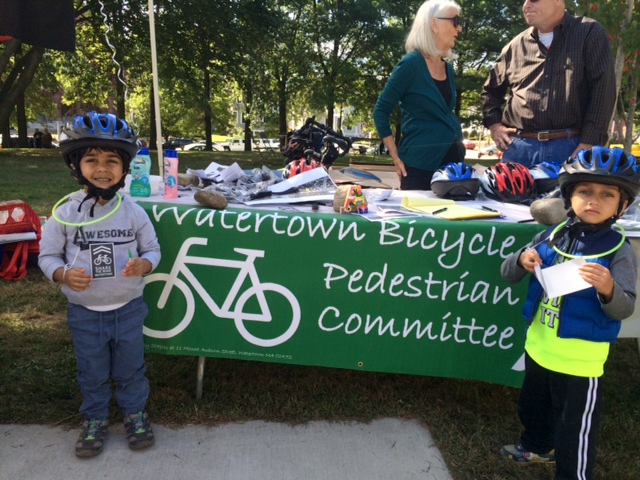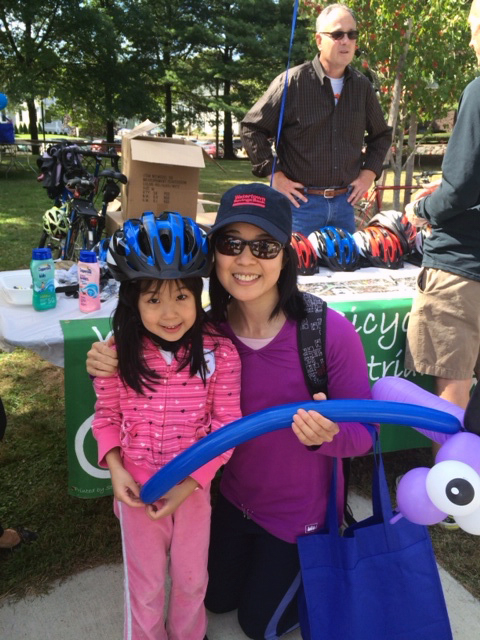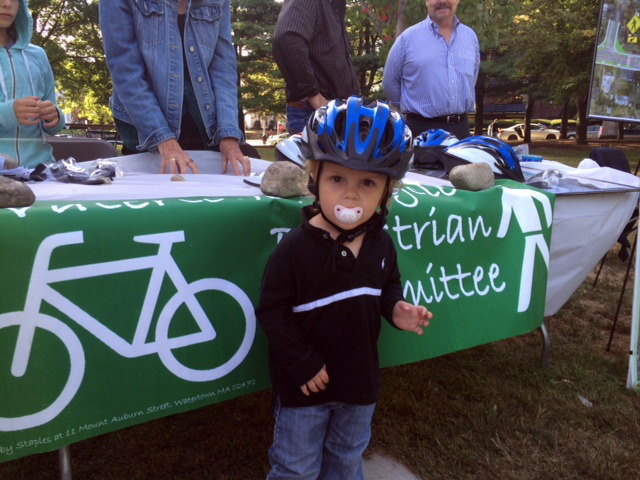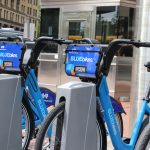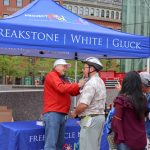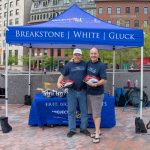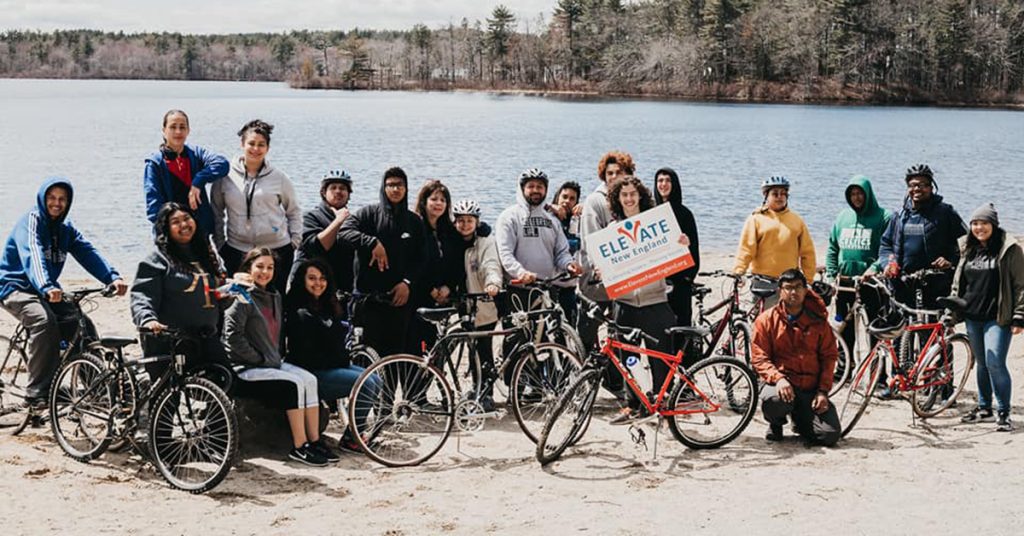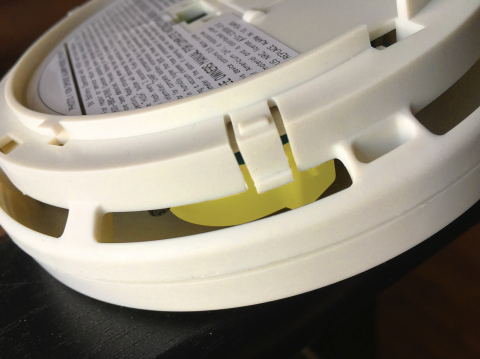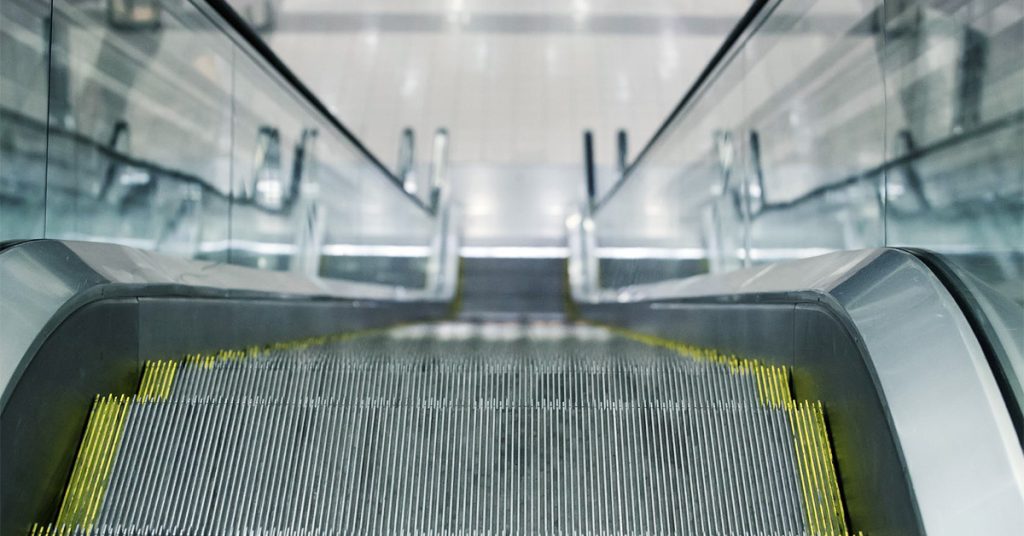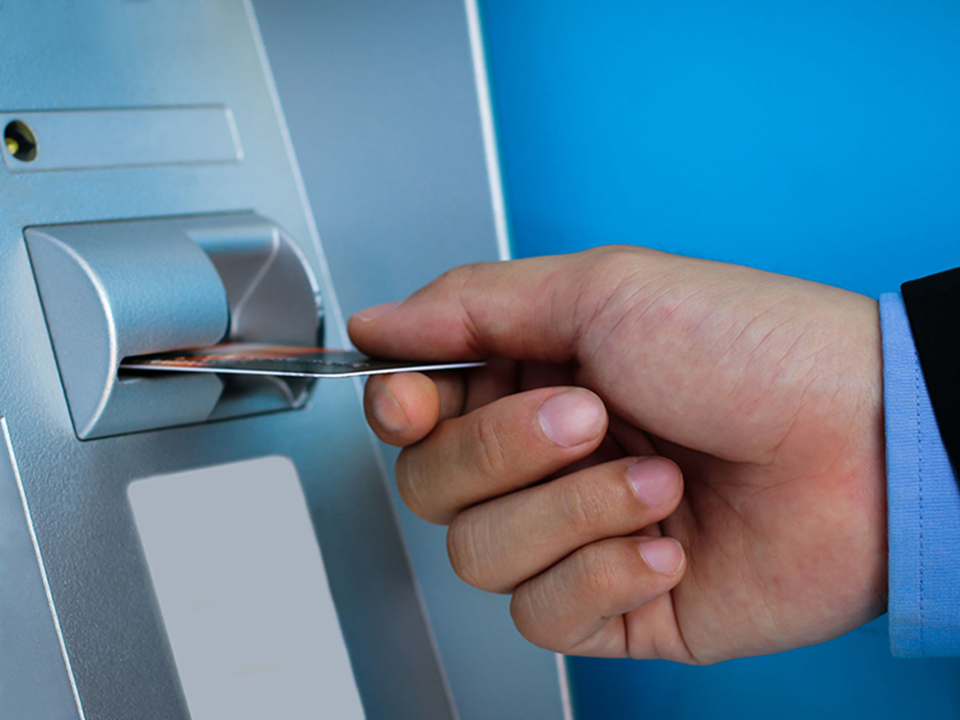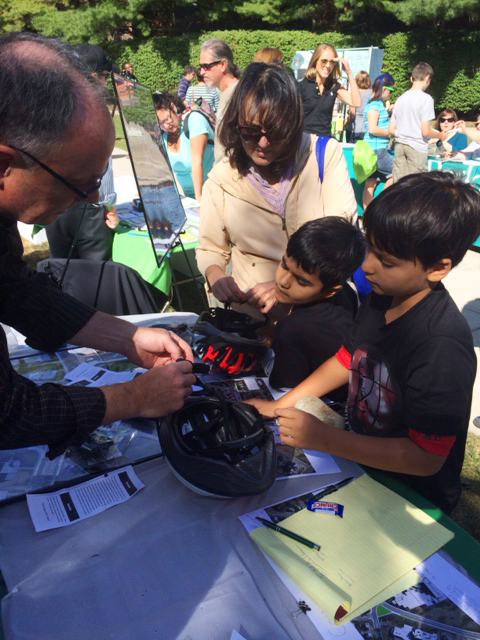Posts Tagged ‘“Boston personal injury lawyers”’
Photos from Boston’s Bike to Work Festival 2018
Breakstone, White & Gluck was pleased to participate in Boston’s Bike to Work Festival on May 18, 2018. The City of Boston organizes this event each year to encourage and celebrate cycling. Cyclists can ride right into City Hall Plaza and enjoy a free breakfast and vendor tables. Our attorneys have participated in this event for the past few years and it’s always a fun way to close out Bay State Bike Week and Bike Month. This year, we set up our Project KidSafe tent and fit 70 free bicycle helmets for cyclists who needed one.
If you missed this year’s event, you can learn more on the City of Boston’s website. Read more about our Project KidSafe campaign on our website.
Here are a few photos from the event:
- Attorney David W. White, Becca Wolfson, Executive Director of the Boston Cyclists Union and Attorney Marc L. Breakstone.
- Blue Bikes. By year’s end, the public bike sharing system is gearing up to be 3,000 bikes strong.
- From 2019 Bay State Bike Week: Attorney David W. White with Galen Mook, executive director of MassBike and Lee Toma, of Milton Bike.
- The line for our Project KidSafe bike helmets!
- Many cyclists rode in on group convoys.
- Attorney David W. White and Attorney Marc L. Breakstone
- Attorney Marc L. Breakstone with a cyclist at our Project KidSafe tent.
Lowell Students Ride Safely With New Bikes and Helmets

Students from Career Academy in Lowell riding new bikes and wearing new helmets.
Though snow fell this week, students from Career Academy in Lowell still managed to make the most of school vacation, fitting in a bike ride to Heart Pond in Chelmsford. This was a special ride because students were pedaling new bikes – and wearing new helmets. Breakstone, White & Gluck was pleased to donate the helmets from our Project KidSafe campaign.
The idea for the bike ride began with Bernice Chandler-Petrovick, who teaches biology. Some of her students needed bikes to get to school and travel more independently. She began teaching students about bicycle safety while also setting out on another goal: finding bikes for her students.
“Most of my students do not have bikes and cannot afford a new one,” she said. “The same is true for helmets.”
Then she found Elevate New England and Breakstone, White & Gluck. Elevate New England is a Lowell-based mentoring organization working with students and schools. The organization gathered used and new bikes, then refurbished the used ones like new for students.
Students can expect to hear more about bicycle safety at Career Academy. Chandler-Petrovick is now working to build a bike rack so students can safely park their bikes at the school. She hopes to expand the bicycle donation program next year.
“Thank you to everyone who helped make this possible,” Chandler-Petrovick said. “I worked with two strong community partners, Breakstone, White & Gluck and Elevate New England. We now have 14 students with bikes and each has a helmet. This project will make a difference for my students and their families.”
Breakstone, White & Gluck launched our Project KidSafe campaign in 2013, with a goal of protecting children from head injuries. Over the past six years, we have donated over 20,000 bicycle helmets, in partnership with police departments, schools and community organizations.
Bicycle Helmet Tips
Wearing a bicycle helmet is the most effective way to protect one’s head if they fall on a bicycle or are involved in bicycle crash. Though millions of Americans ride bikes, fewer than half wear bicycle helmets, according to the Centers for Disease Control and Prevention (CDC). Many states, including Massachusetts, have laws mandating bicycle helmets for younger cyclists. In Massachusetts, you must wear a helmet if you are 16 and younger. However, all cyclists are encouraged to wear helmets for safety and to prevent concussions and serious long-term head injuries.
If you are a parent, make sure everyone in your family has a helmet and they properly fit. Have your children wear one as soon as they get on a bike and wear one yourself so they will follow your lead.
Make sure your helmet is in good working condition. The helmet needs to be able to absorb an impact should you fall. Replace your helmet every few years at a minimum. Resist the urge to pass helmets down between siblings or friends. Helmets are expensive so we know this may be tempting. But you want to make sure the helmet is fit to protect you or your child.
After Kidde Recall, Consumers Are Urged to Check Smoke Alarms
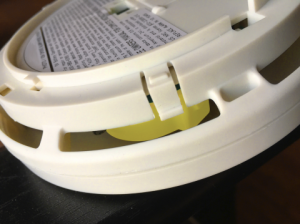
Kidde recalled nearly a half million smoke alarms which may have a dangerous yellow cap left inside. (Recall date: March 21, 2018; Photo: CPSC website)
Please check your smoke alarms when you get home. Kidde has recalled nearly half a million smoke alarms, urging consumers to check devices for yellow caps potentially left on during the manufacturing process. According to the company’s recall notice, the cap would be on one of two sensors inside the smoke detector, compromising the device. Consumers have to do this inspection carefully. You will be looking for the yellow cap through the opening on the side of the device, as shown in the photo. Be careful not to open the smoke alarm or take it apart.
Because Kidde is one of the largest manufacturers, every consumer should check their smoke alarm. If you have a Kidde device, you will need to take it off the wall or ceiling to check the date code on the back. The recalled smoke alarms were dated September 10, 2016 through October 13, 2017. They were sold through January 2018 at Home Depot, Walmart and other retailers. They were manufactured in China, by Fyrnetics Limited, of Hong Kong.
Recall Numbers:
PI9010 (DC/battery powered)
Date codes: Sept. 10, 2016 through Oct. 13, 2017
PI2010 (AC/hardwired)
Date codes: Sept. 10, 2016 through Oct. 13, 2017
Steps for Inspecting Your Smoke Alarm
The Consumer Product Safety Commission recall notice warns consumers not to open the device. Take it off the ceiling or wall, then inspect the alarm through the opening on the side of the device. If you see a yellow cap, you should immediately contact Kidde toll-free at 833-551-7739 for a free replacement. We encourage you to read the recall notice for hours of operation and other information.
Kidde issued the product recall after the yellow cap was found on a smoke alarm which was about to be installed in a consumer’s home. No injuries or incidents reported. Kidde recalled 452,000 smoke alarms sold in the United States and about 40,000 in Canada.
Importance of Smoke Alarms
Smoke alarms are fundamental to safety. Massachusetts has strict laws requiring installation in residential and commercial property. Yet 3 out of 5 home fire deaths in the U.S. are caused by smoke alarm failures, according to the National Fire Protection Association. Nearly 40 percent of these homes had no smoke alarms and about 20 percent had non-working smoke alarms.
Do everything you can to protect your family. Commit to replace the batteries when you set the clocks back or ahead for Daylight Saving Time. Regularly test your smoke alarm batteries every month.
Please share this recall with family members and friends. Offer to help anyone who needs it. In addition to the elderly, check in with college students or adult children who are living in apartments. Also check in with any family members who are new homeowners, still getting to know their appliances.
About Breakstone, White & Gluck
At Breakstone, White & Gluck, our lawyers specialize in personal injury, medical malpractice and product liability cases. Our lawyers are committed to fighting for justice for those who have been seriously injured or killed by the negligence and wrongdoing of others. If you have been injured, learn your rights. For a free consultation, contact our attorneys at 800-379-1244 or use our contact form.
5 Steps to Take Now for a Safe Bike Season in Massachusetts
 Boston saw 70 degrees in February last week. Naturally, many of us are now ready for Spring. If you are a cyclist or have a child who rides, now is the time to get ready for a safe cycling season.
Boston saw 70 degrees in February last week. Naturally, many of us are now ready for Spring. If you are a cyclist or have a child who rides, now is the time to get ready for a safe cycling season.
The attorneys of Breakstone, White & Gluck have long represented cyclists who have been injured by negligent drivers in Massachusetts. We are committed to preventing these bicycle accidents and reducing injuries. In a few weeks, we will begin the 6th year of our Project KidSafe campaign, donating bicycle helmets to children in Boston and other communities. Bike helmets are critical to preventing concussions and traumatic brain injuries. And they are most effective when cyclists start wearing them at an early age with positive reinforcement from parents and other family members.
We will share more on our campaign soon. For now, we have a few bike safety tips from our attorneys and the League of American Bicyclists to help you get ready for a safe cycling season.
1) ABC Quick Check
Check the basics, including the air in your tires, your brakes and the cranks and chain. Then check your quick releases to make sure they are all closed and pointing toward the back of your bike. Then take a quick ride to make sure your bike is properly working. If you are a parent, watch your child on a test ride.
2) Get a Bike Helmet
Always, always wear a properly fitted bicycle helmet. Purchase a new helmet every few years or sooner if you have been involved in a bike crash. A helmet is a critical tool in preventing head injuries and is required by law for cyclists who are 16 and younger in Massachusetts. Families who bike together should wear helmets together. Children are more likely to adopt the habit if their parents do the same.
We are often asked whether cyclists should purchase helmets online or shop local. We suggest you visit the local bicycle shop. Try a few helmets on while getting help from an experienced cyclist. Buying the right size is hard and an experienced cyclist can be very helpful. Beyond that, bicycle shops are a lot of fun. You can learn a lot about cycling in your area by visiting one.
Here is a video on how to fit a helmet.
3) Stock Up on Bright Colored Clothing
Whether you ride in cycling gear or street clothes, we suggest you purchase a neon safety vest for yourself and family members. You can wear it every time you ride to stand out or just in busy traffic.
4) Check Your Equipment
In Massachusetts, cyclists must use bike lights so they are visible to motor vehicles in the morning, up to one-half hour before sunrise, and in the evening, starting no later than thirty minutes after sunset. Remember—dusky hours can make you very hard to see, which is why that bright clothing is even more important. Read more about the law on our website.
5) Prepare for the Bike Trail
Remember the rules of safety on bike trails, too, and always be considerate of other cyclists. Do not speed. Travel on the right. Pass on the left. Use a bell or announce you plan to pass another cyclist. Although you are permitted to ride two-abreast, courtesy suggests you should ride single file when you travel in a group. Finally, expect to stop when the bike trail crosses street traffic.
About Breakstone, White & Gluck
The Boston personal injury lawyers at Breakstone, White & Gluck have over 100 years combined experience representing pedestrians, cyclists and others injured by car accidents. We are committed to safety for cyclists. Through our Project KidSafe campaign, we have donated more than 15,000 bicycle helmets to children in Massachusetts. For our commitment to safety, our firm has been recognized by the League of American Bicyclists as a Silver Level Bicycle Friendly Business.
If you have been injured by someone else’s negligence, it is in your best interests to consult a personal injury lawyer and learn your legal rights. For a free legal consultation, contact our attorneys at 800-379-1244 or 617-723-7676 or use our contact form.
Elevators and Escalators Have Long Been Out of Order at Westwood Train Station
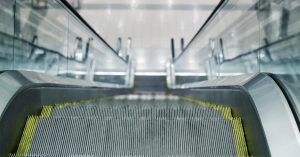 Commuting is a major stress in the Boston area. Having to ride the MBTA should ease the burden. But it often just adds anxiety, especially for commuters at the Route 128/University Station in Westwood.
Commuting is a major stress in the Boston area. Having to ride the MBTA should ease the burden. But it often just adds anxiety, especially for commuters at the Route 128/University Station in Westwood.
Two news stories have put the spotlight back on the long-running equipment and system problems at the Westwood station, including out-of-service elevators and escalators. Offering both MBTA and Amtrak train service, the Westwood station serves half a million commuters each year. When systems are running on time, you can take the MBTA into Boston in less than a half hour. The MBTA also offers service to Providence or Amtrak provides travel beyond Rhode Island.
With over 2,500 spaces, the Westwood station is also one of the rare MBTA stops where you can still find a parking space. The problem is walking through the station.
The station is owned by Amtrak, which has frequently closed escalators and elevators over the past few years. One of the two elevators has been out of service altogether for several years. They are in no condition to re-open. According to a recent NBC Boston report, every escalator and elevator has expired state certifications. NBC Boston first reported on the station three years ago, so this isn’t a new story. It is just one which has grown worse.
Amtrak says it has no responsibility to make repairs, citing federal law which exempts it from meeting all state and local building regulations. State officials say they have met with Amtrak, to no avail.
Failure to maintain the escalators and elevators creates a safety hazard for commuters and puts an extra burden on the handicapped. NBC Boston interviewed a rider who was legally blind and spoke about having to climb the Westwood station’s tall staircases. As a result, he has missed his special needs van on some days.
We need to learn from past tragedies on escalators and elevators, including the fall that killed 4-year-old Mark DiBona in 2011. The child fell from a defective second-floor escalator at the Auburn Mall. The escalator had a 6 inch gap, which exceeded state regulations. Lawyers for the boy’s family said the escalator management company was aware of the gap and had filed plans with the town to fix it. But the company never followed up. The little boy suffered a head injury in the fall and died the next day.
Hopefully, the state, MBTA and Amtrak will reach agreement on the much needed repairs at the Westwood station soon. All three have a responsibility to the public and commuters. But it’s also important because another public safety concern has recently arisen at the station.
After a long day in Boston, every commuter just wants to get home. Over the past year, the rush has gotten worse at the Westwood station. Some commuters are now running to their cars to beat traffic backups and 20-minute delays leaving the station.
The traffic backups are a new development. Drivers used to have two choices to pay for parking. They could pay inside the station with their credit card or they could simply drive through the parking garage exit. The parking fee would be deducted from their car’s EZPass. Now, the MBTA requires drivers to stop at the parking exit and select how they want to pay. Meanwhile, traffic lines up and pedestrians are put at risk.
WBZ’s I-Team reported on the parking garage earlier this month. The MBTA said the new system has reduced duplicate charges, resulting in fewer refunds. But things need to change at the Westwood station before there is a serious pedestrian accident.
If you see a safety hazard in any MBTA station, we encourage you to take a photo with your cell phone and report it. You can also report equipment that is out of service for a long period of time.
We suggest reporting the problem to at least two offices – the MBTA and the local police department. A local police department can log your complaint immediately while the MBTA or MBTA police may not respond for a few days.
You can also try submitting complaints to the town officials in the community where the MBTA station is located. Try the local building department, the Board of Selectmen or City Council office. Other resources are the state Department of Transportation, your state representative and your local regional transportation agency. These offices may not be directly responsible for a train or bus station, but it may help to keep them aware of ongoing transportation and safety issues.
Here are a few links:
MBTA Customer Support. This page gives you the option to upload a photo.
Regional Public Transportation Authorities in Massachusetts
Massachusetts Department of Transportation
About Breakstone, White & Gluck
The Boston personal injury lawyers at Breakstone, White & Gluck are experts in handling claims involving premises liability and injuries caused by defective property conditions. If you have been injured by someone’s failure to maintain their property, learn your rights. For a free legal consultation, contact Breakstone, White & Gluck at 800-379-1244 or 617-723-7676 or use our contact form.
Breakstone, White & Gluck’s Partners Recognized on the 2017 Massachusetts Super Lawyers List
Breakstone, White & Gluck is pleased to announce that Marc L. Breakstone, David W. White and Ronald E. Gluck have been selected to the 2017 Massachusetts Super Lawyers list. Our attorneys were recognized for their work for clients in personal injury and medical malpractice cases. We are proud to share this news. It marks the 14th year they have been selected to the list, which only recognizes the top 5 percent of attorneys in the state.
The Super Lawyers selection process evaluates attorneys based on 12 areas, including verdicts and settlements, experience, honors and awards, bar and professional activity, pro bono and community service and other achievements. The selection process includes input from the Super Lawyers research department and peer review from other attorneys.
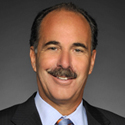
Marc L. Breakstone
Attorney Marc L. Breakstone has been recognized to the Top 100 New England Super Lawyers and Top 100 Massachusetts Super Lawyers lists numerous times over his career. He was recognized on the 2017 Massachusetts Super Lawyers list as a top rated medical malpractice attorney, an honor he has received each year since 2004. His settlements and verdicts include a $10.2 million settlement for an infant who suffered severe injuries due to ambulance negligence and $7.5 million for a family who lost a loved one in a propane gas explosion at a construction site. He also won a $7.1 million award for a pedestrian who was hit by an MBTA bus. Attorney Breakstone, a graduate of Northeastern University School of Law, has practiced in Boston for more than 30 years.
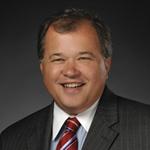
David W. White
Attorney David W. White has been selected as a Top 100 New England Super Lawyer, a Top 100 Massachusetts Super Lawyer and Massachusetts Super Lawyer numerous times over his career. He was recognized on the 2017 Massachusetts Super Lawyers list as a top rated personal injury attorney. A past president of the Massachusetts Bar Association, Attorney White has practiced law in Boston for almost 35 years. A graduate of Northeastern University School of Law, Attorney White has been recognized for his work on personal injury cases, as well as in insurance law. Attorney White’s settlements and verdicts include $4.35 million for a construction accident victim and $2.5 million for a client who suffered severe burns due to a homeowner’s negligence.
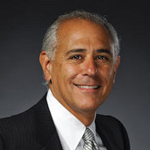
Ronald E. Gluck
Attorney Ronald E. Gluck is an accomplished, widely respected and results-driven lawyer who has obtained multi-million dollar awards for his clients in a range of serious personal injury cases for over 35 years. Each year since 2005, Mr. Gluck has been named a top rated personal injury “Super Lawyer” in Massachusetts. His career has focused on cases ranging from those involving pedestrians, bicyclists and motorcyclists injured or killed by the negligence of others to disasters involving train crashes, truck accidents and medical malpractice causing wrongful death, traumatic brain injury and severe orthopedic injury. Attorney Gluck’s approach is to get the best results in the most efficient and effective manner for his clients while making sure that the responsible party is held accountable for their negligence. Following the attacks of 9-11, Mr. Gluck donated his time and expertise to represent the family of a young professional who was killed while a passenger aboard the American Airlines plane that crashed into the World Trade Center. Awards and settlements for Mr. Gluck’s clients include a $3.75 million award to a motorcyclist who suffered brain injuries; $2.5 million to a businessman who suffered spinal injuries in an 18-wheel truck crash; $2 million to the family of a child with mental health disabilities who died as a result of medical negligence, and a confidential settlement to the family of a physician who was hit and killed by a truck while she was riding a bicycle. Mr. Gluck is widely known and respected for his technical legal skills as well as his compassion and professionalism.
| Our Results for Clients | |
|---|---|
| $10.2 million | Award for an infant injured by ambulance malpractice |
| $7.5 million | Award for family which lost a loved one in a propane gas explosion |
| $7.5 million | Award for an infant who suffered severe brain injury from medical malpractice during and after anesthesia |
| $7.1 million | Award for a woman who was hit by an MBTA bus |
| $5.7 million | Award for the victim of medical malpractice |
| $4.35 million | Award for a worker who fell as a result of a defective railing |
| $3.75 million | Award for a motorcyclist who was hit by a negligent driver |
About Breakstone, White & Gluck
In 2017, Breakstone, White & Gluck celebrated our 25th year of serving clients who have been injured in personal injury, car accident and medical malpractice cases. We represent clients in Boston, Cambridge, Somerville, Quincy and across Massachusetts. If you have been injured by someone else’s negligence, learn your legal rights. Contact us for a free legal consultation at 800-379-1244 or 617-723-7676. You can also send us a message using our contact form.
Protect Yourself From ATM Skimming
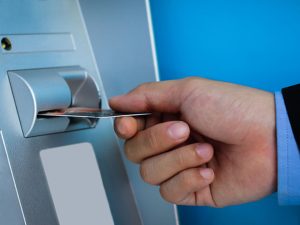
Take the right steps to protect yourself from ATM skimming. Many Massachusetts consumers have been targeted.
You insert your ATM card and out comes cash for the week. Simple, right? Next time, pay closer attention. Many Massachusetts consumers are being scammed – or skimmed – for their financial information, at a tremendous price.
ATMs – automated teller machines – are a convenient way to get cash or make deposits. Unlike banks, they are always open and accessible.
But they are vulnerable to ATM skimming, when thieves install hidden electronic skimming devices on an ATM to record a consumer’s financial information. Massachusetts has seen several recent cases.
Just this week, Cambridge Police issued an alert, seeking a man who fraudulently ran up $800 on a Cambridge woman’s ATM card. Police say he may have skimmed her financial information at an ATM in Boston. ATM skimming rarely claims just one victim, though. In June, the Lowell Sun reported on two men who pled guilty after ringing up over $100,000 on 100 credit card numbers they skimmed in the Boston area. Other stories have also been reported in Framingham, Burlington and on the South Shore
The problem is skimming devices are often small and look like part of an ATM, so consumers may not notice them, even if they are looking.
Use caution at the ATM machine. We suggest the following tips to help you protect your financial information:
- Examine the card slot before inserting your card. Look for anything loose, crooked, damaged or scratched. If you observe anything suspicious, do not swipe your card. We suggest you read this article, “How to Spot and Avoid Credit Card Skimmers,” by PC Magazine.
- Thieves also need your PIN code. They often record your information through hidden cameras. When entering your PIN, cover the keypad with your other hand to prevent your PIN from being recorded.
- Walk away from an ATM if you notice someone watching you or you sense something is wrong with the machine.
- Avoid ATM machines with minimal supervision. For instance, try not to use stand-alone ATM machines in convenience stores, bars or parking lots.
- Also beware of skimming devices when paying at gas stations.
- If an ATM does not return your card when a transaction is over, report the incident immediately to your financial institution.
- Never give out your bank account number or the PIN for your ATM card. If someone calls you and asks for your information, hang up and report the call to your local police department.
- Monitor your account for unauthorized transactions and report them to your financial institution immediately. Most banks offer online access, which allows you to check your statements easily.
- Set a daily cash withdrawal limit. Ask your bank and credit card company to notify you of transactions—these can be sent right to your cell phone.
- Check in on senior citizens in your family or neighbors. Tell them you are concerned about ATM skimming. Remind them to check their bank accounts, and also, to never give their financial information out to callers over the telephone.
- The most important step? Contact police and your bank if you suspect anything suspicious. The sooner police and your financial institution can start investigating, the better for everyone using the ATM machine.
If you do find yourself a victim, remember you have rights. Under Massachusetts law, consumers are only liable for up to $50 if they are the victim of credit card or debit card fraud. But you must report the fraud immediately to avoid any financial losses. Read this article to learn more.
Use Space Heaters with Caution
During these cold and frigid days of winter, some of us are reaching for space heaters. If you can, first try to keep warm other ways: reach for blankets or an extra layer of clothing. But if you must use a space heater, use it with caution and make sure you use it properly. According to the National Fire Protection Association (NFPA), space heaters are involved in 32 percent of home heating fires and 79 percent of home heating fire deaths in this country. They are the second leading cause of home fire deaths behind smoking.
There have been several heartbreaking stories this winter. In Baltimore, six children were killed in a devastating fire last month. Officials are still investigating, but say it may have been sparked by a space heater. Just a few days ago, a 50-year-old Fall River woman tragically died after a space heater fire ignited her home.
According to the State Fire Marshal’s office, Massachusetts fire departments responded to 133 space heater fires from 2006 to 2015, resulting in 9 civilian deaths and 22 civilian injuries. Some 31 fire service members suffered injuries.
The Today Show aired a segment this morning, which shows just how quickly space heater fires can ignite. We encourage you to watch it.
Safety Tips for Properly Using a Space Heater
Three Feet Rule. Keep space heaters 3 feet away from all furniture and people. Put them in the center of the room.
Plug in to Wall. Plug space heaters directly into the electrical socket on the wall. Many extension cords cannot handle the strong level of electricity passed on from a space heater.
Beware of Automatic Switches. These switches are helpful, but are not a substitute for you turning off your heater yourself, unplugging it and putting it away.
Turn Space Heaters Off Properly. Turn off space heaters before you go to bed when no one can monitor them. Turn it off anytime you cannot supervise it.
Keep Space Heaters Away from Water. Do not use space heaters near sinks or in bathrooms.
Create a Fire Escape Plan. Family members should all know how to properly evacuate the home and be aware of all the routes.
Check Your Fire Alarm Once a Month. This is always a good idea, but extra important during the winter months.
Inventory Your Home. Because half of all home heating fires occur during December, January and February, now is a good time to walk through your home and look for hazards. Look outside, too. Make sure your home’s outside furnace vent is clear of snow. A blocked vent can put your family at risk for carbon monoxide poisoning.
Take Extra Precautions if Children Are in Your Home
Take extra precautions if you live with children. Establish a child-free (and pet-free) zone if you set up a space heater. Keep children as far away from the space heater as possible at all times. Also keep toys away. When finished, turn the space heater off and unplug it. Put it in a safe place which it out of reach of children.
Massachusetts Social Host Law: Teenagers and Even Parents Can Face Criminal Charges and Financial Losses for Underage Drinking
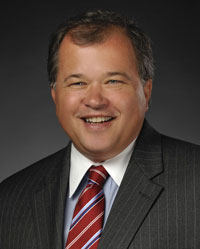 During prom and graduation season, students should be enjoying their friends and last days of high school. But this time can turn painful if you or your teenager allow underage drinking in your home.
During prom and graduation season, students should be enjoying their friends and last days of high school. But this time can turn painful if you or your teenager allow underage drinking in your home.
Breakstone, White & Gluck cares about the safety of teenagers on the road and offers these tips and reminders about the Massachusetts Social Host Law, M.G.L. c. 138, § 34.
“Very few parents realize just how much is at stake when they allow underage drinking in their home,” said Attorney David W. White of Breakstone, White & Gluck. “You may have to live with the painful knowledge that you contributed to a car accident which caused serious injury or death. Plus, you may have to serve jail time and could even lose your home to a lawsuit.”
Under the Social Host Law, it is a criminal offense for parents and teenagers to provide alcohol to anyone who is underage for consumption in their home. It is also illegal to allow a minor to bring alcohol from elsewhere to drink in your home.
You can also be charged if underage guests are drinking at other places you control, such as a hotel room, a vacation house, or a rental property.
Consequences
If you are charged under the Massachusetts Social Host Law, you could face a fine up to $2,000, imprisonment for up to a year or both. You may also face a civil lawsuit. Your homeowner’s insurance policy may or may not cover the full amount.
You could also be held civilly liable if you provide your teen alcohol to drink at someone else’s home and they later injure someone while driving.
These Cases Really Do Happen
Teenagers and adults are charged criminally for violating the Social Host Law every year in Massachusetts. For example, in December 2015, a Saugus couple – two teachers – were sentenced to jail for hosting an August 2013 party at their home where teens were drinking. Police learned about the party when a 16-year-old became ill and had to be treated at a local hospital.
The two teachers – one an Everett High School teacher – were sentenced to 30 days in jail, with the balance suspended for two years. During that time, they must stay drug and alcohol free and perform 50 hours of community service.
There have been many other criminal cases in Massachusetts. There have also been civil cases.
Attorney David White provided legal commentary on one 2014 case for Fox 25 TV News. A 23-year-old man was ordered to pay $2 million to the parents of a Salem State College student who consumed alcohol at a party he hosted. She was killed in a car accident after she left, in a car driven by her boyfriend who had been also been drinking at the party. Read this coverage.
Here are a few safety tips for you and your teen:
Tell Your Teen There is Zero Tolerance for Underage Drinking. Tell your teen there is zero tolerance for violating the Social Host Law or any underage drinking. Explain what is at stake for them and your whole family.
Help Your Teenager Plan. Help your teenager develop a safe after-prom or graduation plan. Some high schools or community groups organize events as safe havens where there will be no alcohol.
Have Your Teen Commit to Safety. Ask your teen to sign a pledge not to drink or get in the car with others who have been drinking. Here is one pledge from Mothers Against Drunk Drivers (MADD). You can find others online or create your own.
Also, tell them they must always stick with the schedule when they are out with friends and call you beforehand about changes or unplanned stops.
Safety Code.Finally, have a safety code you can use with your teenager. If they call you during the evening, you can ask them if they feel safe or want to come home. That way you, as the parent, can take the blame for prohibiting any change of plans. Your teen can save face by “blaming” you and telling their friends they cannot go out this time.
About Breakstone, White & Gluck
The Boston personal injury attorneys at Breakstone, White & Gluck have over 100 years combined experience handling serious car accidents. If you have been injured, it is important to learn your rights. For a free legal consultation, contact us at 800-379-1244 or 671-723-7676 or use our contact form.
Breakstone, White & Gluck Donates Bicycle Helmets in Watertown
Breakstone, White & Gluck and the Watertown Bicycle & Pedestrian Committee recently partnered up and gave 120 bicycle helmet to children. Breakstone, White & Gluck donated the helmets through our Project KidSafe campaign. Committee members then gave of their time and distributed helmets to children at the Watertown Faire on the Square on Sept. 26th. All 120 helmets were given away in one day!
Our thanks to the Watertown Bicycle & Pedestrian Committee, which sent along a few photos:
